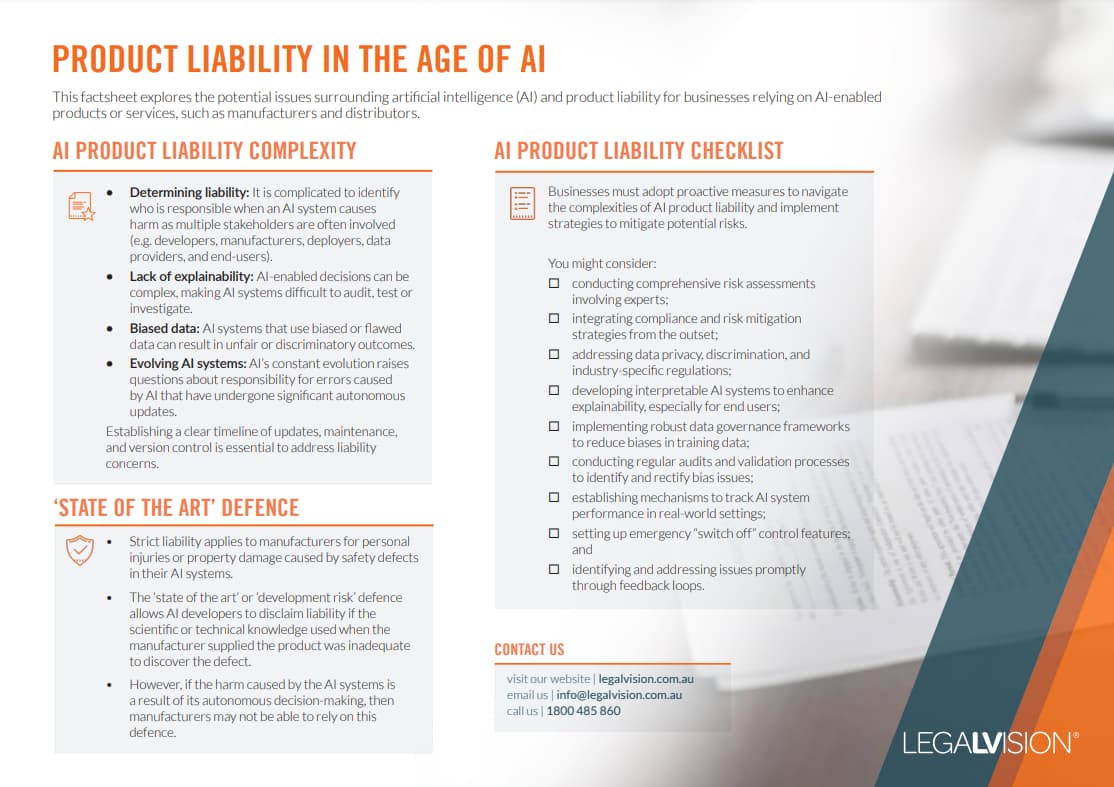As a manufacturer, you need to familiarise yourself with your responsibilities to consumers regarding product liability. However, even the most careful manufacturer must be aware of their obligations under Australian consumer law regarding product liability. This article will take you through the legal implications of product liability law for you as a manufacturer.
Consumer Guarantees
The consumer guarantees are rights given to consumers under Australian law that protect them when buying consumer products or services. Regardless of any terms you have included in any contracts, consumers still have rights given to them by consumer guarantees. The key consumer guarantees to be aware of as a manufacturer are:
- Goods must be of acceptable quality: Whether your product is of acceptable quality, such as:
- they are safe, durable and free from defects;
- acceptable in appearance and finish; and
- do everything they are commonly used for; additionally
- Goods must match descriptions made by salespeople: If you sell your manufactured products to consumers or retailers, any descriptions or claims you make about the product must be accurate. For example, if you claim your speakers have a 30-hour battery life, they must have at least a 30-hour battery life. Making bold claims about your products is a good marketing strategy, but you must be able to back those claims up; and
- Goods must have spare parts or repair facilities available for a reasonable time after purchase: Besides any warranties, consumer law gives consumers the right to spare parts and repairs for a reasonable period after buying your products. A reasonable time will depend on the nature of the product you are selling. However, you will not be required to if you clearly inform your customers before purchase that you will not provide repairs or spare parts.
If you violate the consumer guarantees, you are required by law to provide the customer with a replacement or compensation. Regardless, if your product was purchased from a retailer, you may be liable to replace or pay for a product that has violated the consumer guarantees.
Misleading or Deceptive Conduct
Consumer law protects consumers from misleading or deceptive conduct on the part of retailers, such as:
- misleading and deceptive conduct leads a consumer to believe something that is not true or correct about your product or your business;
- even if you do not intend to mislead or deceive your customers, you can still be liable if the conduct is misleading or deceptive;
- conduct can involve actions you take when dealing with the customer, actions you do not take when dealing with the customer, information you provide to the customer or information you do not provide to the customer; and
- you also do not need to harm the consumer to contravene the requirement. Even if the consumer has not suffered any loss or inconvenience, you can face legal consequences for your deceptive or misleading conduct.
If you engaged in conduct that was likely misleading or deceptive, you may be required to pay substantial fines.
Continue reading this article below the formSafety Defects
You may face legal action when a customer has suffered injury, death or damage to their property due to a safety defect. Additionally, you are liable for safety defects in your goods as a manufacturer who has sold those goods to consumers. The required safety standard will differ depending on the product’s nature and how a customer would typically use it.
Whether or not you will be liable for a safety defect will depend on certain factors. These may include, but are not limited to:
- how the product was marketed, the packaging, instructions and warnings;
- the reasonably expected use of the product; and
- how old the product is and whether it is a newer or older model of the product.
How You Can Prevent Legal Action Against Your Business
To minimise your product liability, you can do a few key things:
- do not make promises you cannot keep. Descriptions of and claims about products should all be backed up with facts;
- make sure you are clear and truthful. Provide all the information the consumer needs to make an informed decision;
- rigorously test the quality and safety of the products you manufacture; and
- if you cannot provide repairs and spare parts for products, make that clear to customers before they make a purchase.

This factsheet explores the potential issues surrounding artificial intelligence (AI) and product liability for businesses relying on AI-enabled products or services, such as manufacturers and distributors.
Key Takeaways
In many cases, Australian consumer law places manufacturers’ liability for product issues squarely on their shoulders. Understanding your obligations regarding product liability is essential. These are key considerations to keep in mind:
- consumer guarantees require products to be an acceptable quality;
- you must not engage in conduct that will or will likely mislead or deceive consumers;
- you may be liable for safety defects in the products you manufacture; and
- methods minimise the risk of legal action due to product issues.
If you need help meeting your obligations in relation to product liability, our experienced competition lawyers can assist as part of our LegalVision membership. For a low monthly fee, you will have unlimited access to lawyers to answer your questions and draft and review your documents. Call us today on 1300 544 755 or visit our membership page.
We appreciate your feedback – your submission has been successfully received.











